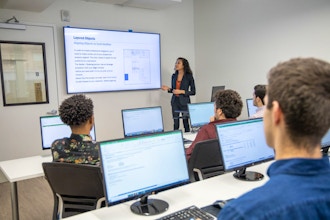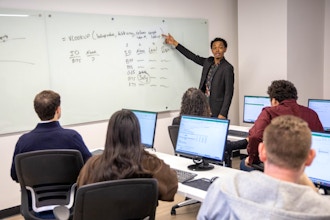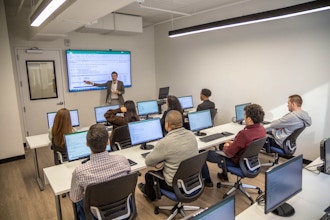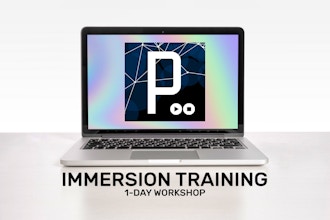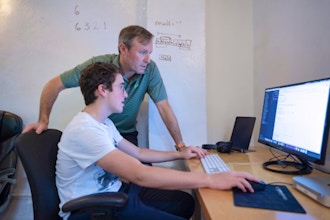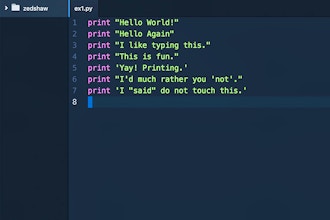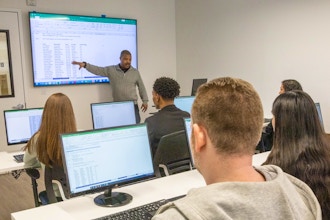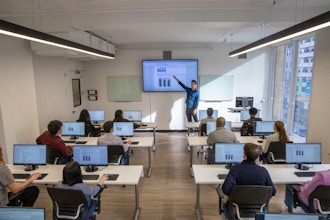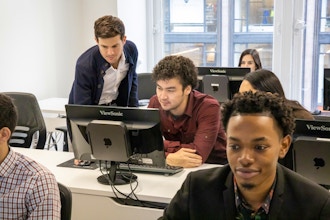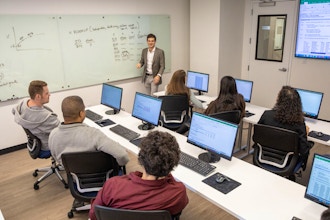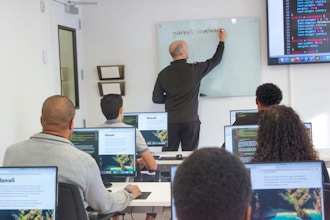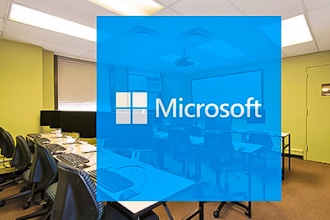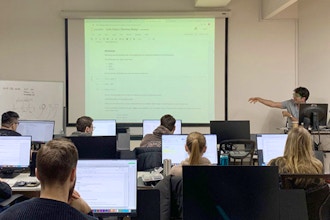Discover the Best Coding Classes in NYC
Coding is creating instructions or algorithms that a computer can understand and execute. It involves writing code in a programming language to develop software applications, games, websites, and more. Coding is fundamental to digital technology development, enabling us to interact with computers and other devices.
There are several reasons why people might want to learn coding. It offers many lucrative career prospects in a rapidly expanding tech industry, as highly skilled programmers are in great demand in an era of increasing digitization. Furthermore, coding is a powerful tool for problem-solving and self-expression, allowing programmers to develop creative solutions for complex problems or to bring their ideas to life through digital art, interactive websites, video games, or applications.
Best Coding Classes & Schools in NYC
Located in Midtown, NYC Career Center’s JavaScript for front end is a hands-on, advanced course that teaches the essential skills needed for front end web development using JavaScript and jQuery. Students learn to add interactivity to webpages using JavaScript and jQuery libraries and also cover event handling, form validation, and AJAX for seamless data retrieval and updates. By the end of the course, participants have the skills to build interactive and engaging front end experiences using JavaScript and jQuery, enhancing their capabilities in web development.
Noble Desktop’s Full-Stack Web Development Certificate students learn to build both the front and back end of websites and applications. Students first learn HTML, CSS, and JavaScript to create visually appealing web pages. The project-based curriculum also introduces students to the MERN tech stack, which includes MongoDB, Express.js, React, and Node.js, to add databases, APIs, server environments, and interactivity to web applications.
Practical Programming’s JavaScript Development with Node, Express, & MongoDB teaches students how to build server-side applications using JavaScript, Node.js, Express, and MongoDB. The curriculum covers setting up a Node.js development environment, handling HTTP requests, building RESTful APIs, and connecting to a MongoDB database. Participants learn to use Express.js to create server routes, handle middleware, and manage session and authentication. The program also covers CRUD operations with MongoDB, including data retrieval, insertion, updating, and deletion. Participants gain practical experience through hands-on exercises and projects, building full-stack JavaScript applications using the MERN (MongoDB, Express, React, Node.js) stack.
If you’re interested in a career in machine learning (ML) or artificial intelligence (AI), check out NYC Data Science Academy’s Data Science with Machine Learning Bootcamp. Located at their Midtown NYC campus, this bootcamp teaches students foundational data science skills through R and Python before moving to more advanced machine learning techniques. Brainstation also offers a Data Science with Bootcamp at their NYC campus, where students will learn data science fundamentals, data analysis and visualization techniques, and artificial intelligence and machine learning concepts.
NYC Industries That Use Coding
New York City is an industrial and commercial center, with various industries fueling its economy. The city's thriving economic scene reflects its diverse population, with businesses spanning from banking and technology to healthcare, journalism, and fashion. Because of its rich history, diverse culture, and strategic position, the city has drawn firms from all over the world, transforming it into a global trade hub. Many of these industries hire coding professionals to help power digital solutions. Some of the major industries in NYC that use coding include:
Finance
New York City is the world's most sophisticated and diverse financial center. The city is home to 45 Fortune 500 companies and boasts one of the broadest capital pools. Wall Street is a significant hub for financial technology, or fintech, which develops and manages complex trading systems, algorithms, and data analytics tools using coding.
Technology and Media
With an 18% growth rate in tech sector jobs over the past ten years, tech in NYC is becoming an increasingly important sector in the city, with an increasing number of intersections with other industries. Many tech and media start-ups and companies use coding to create websites, web and mobile applications, video games, and other digital content. A few notable tech and media companies in NYC include Slack, Vimeo, Square, and Gimlet Media.
Retail and E-commerce
New York City is home to the world's premier retailer and is a leader in e-commerce with 300+ startups. Many of the city's largest merchants and e-commerce enterprises employ coding to create and maintain their websites, mobile applications, and inventory management systems. A few companies based in NYC include GrubHub, Rokt, LeafLink, and TaskRabbit.
Education:
NYC has a large education sector, and many schools, colleges, and universities use coding to develop educational software, online learning platforms, and other digital tools for students and teachers. The NYC Department of Education serves over 1 million students at 1800 schools citywide. 2U, a notable education technology company, supplies nonprofit colleges and universities with cloud-based software platforms to deliver online degree programs to students.
Government
The government sector in NYC uses coding to develop software and websites for public services, analyze data to inform public policy decisions, and manage city infrastructure.
Coding Jobs & Salaries in NYC
Various coding career opportunities in New York City offer lucrative compensation to employees. A few examples include:
Software Engineers
Software engineers use programming languages, mathematics, UX design, and engineering approaches to design, create, and test software applications. While most software professionals are proficient in full-stack web development, others prefer to focus on either front end or back-end development. Software developers create video games, web apps, mobile apps, and operating systems. The most frequent programming languages for Software Engineers to learn include JavaScript, Swift, Scala, Go, Python, Ruby, C#, and Elm. An NYC-based Software Engineer earns an annual salary of $143,000, well above the national average.
Machine Learning (ML) Engineers
ML Engineers research, design, and develop artificial intelligence (AI) systems. ML Engineers use large data sets to develop algorithms capable of learning and automating prediction. ML Engineers are behind virtual assistants like Siri and Alexa, facial detection and recognition that unlock our cell phones, and the movie and television recommendations suited to each user on Netflix. An ML Engineer living in Los Angeles can earn an annual salary of $188,000, above the national average.
Data Scientist
Data Scientists, also known as Data Engineers or BI Developers, collect, organize, and analyze data to inform decision-making. These data professionals have strong statistics, programming, and mathematics backgrounds. Data Science languages to master are Python, SQL, R, C/C++, Java, and JavaScript. Data Scientists work with NGOs, governments, and other organizations to create actionable strategies based on data trends. A Los-Angeles based Data Science can earn an average annual salary of $126,000, well above the national salary.

